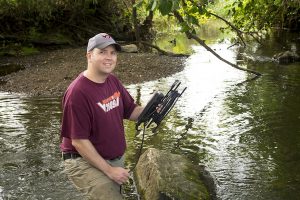
From VTNews
BLACKSBURG, Va., March 2, 2016 – Aquatic life can suffer when high concentrations of dissolved salts enter freshwater ecosystems, a process known as salinization.
An international, multi-institutional team of researchers that includes a Virginia Tech graduate student recommends ways that humans can protect freshwater from salts in an article Friday in a recent article in the journal Science.
The recommendations include the use of less water for agricultural practices, less salt for road de-icing, less discharge or sequestering salts during mining operations, and re-routing of urban salt discharges to retention basins rather than treatment plants or streams.
“We’ve written the paper as a call to action, or at least a call to awareness, and we’ve tried to describe what we think will be an effective path forward,” said Tony Timpano of Herndon, Virginia, a doctoral student in the Department of Forest Resources and Environmental Conservation in the College of Natural Resources and Environment.
Photo credit: Tim Skiles
